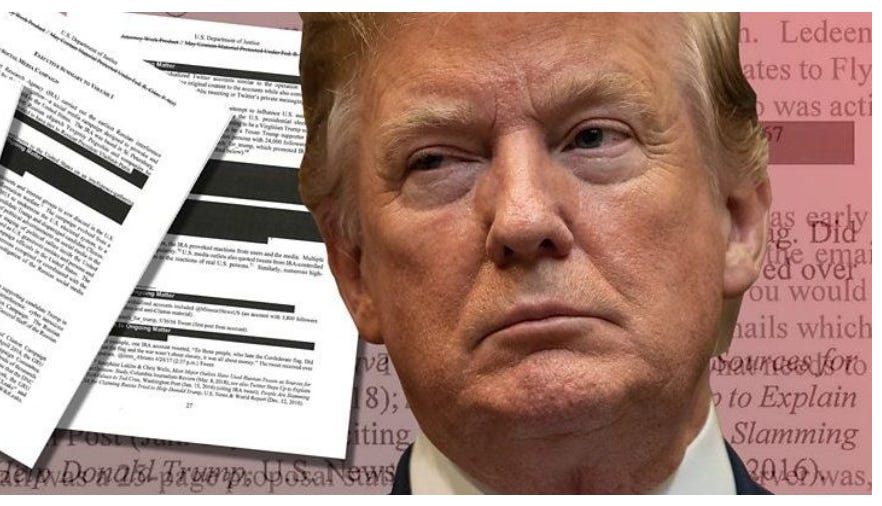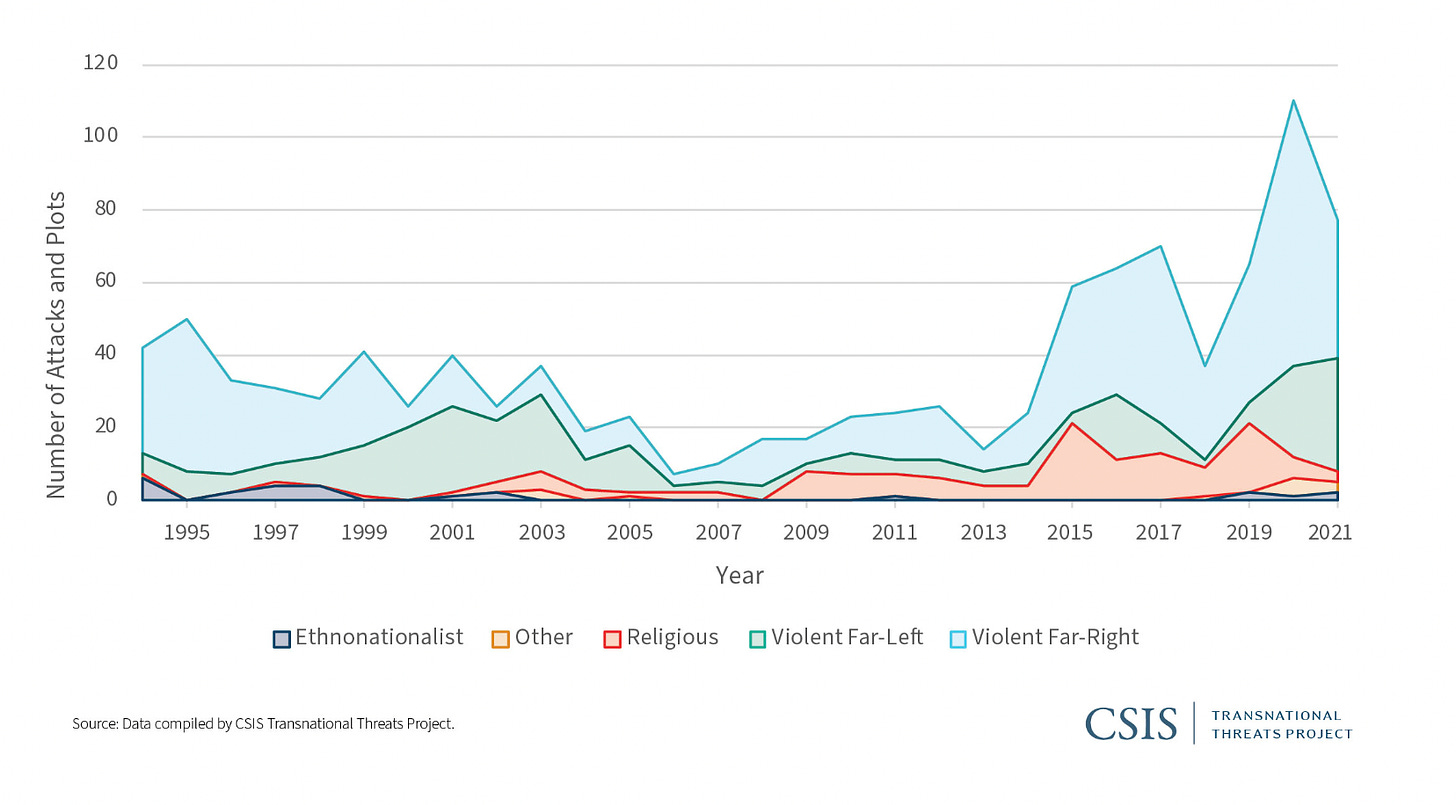From Access Hollywood to Anti-Statism
Republican loyalty to Trump is fueling more radical positions about the role of the state
The FBI’s search of Trump’s Mar-A-Largo left many unanswered questions but revealed one basic fact about contemporary American politics: the conservative movement has abandoned a healthy skepticism of government to embrace a peculiar brand of anti-statism. As soon as the news of the search broke, Republican leaders and right-wing media fell over themselves to attack public officials rather than accept the possibility that a man with decades of dishonesty behind him might have done anything wrong.
The political philosophy underpinning this support for Trump holds that state power is corrupt, and this corruption in turn justifies abuses of state power that Trump and supporters are promising in the future. Our victimhood necessitates our extremes. As an approach to governing, it is deeply destructive to a pluralistic democracy where parties exchange power on a routine basis.
Reflexively anti-statist (when we are not in charge)
Republicans concerned about the investigation of Trump could take two tracks. One is to ask for information and justifications from the relevant government officials. This shows a faith in democratic processes, and checks and balances. Some did, and Merrick Garland quickly responded by seeking to make the details of the warrant available.
The other option was to assume without evidence that the search was illegitimate. This was the route that many Republicans took. It quickly took an extreme and even absurdist form.
“If they can do this to a former President, imagine what they can do to you” was a popular mantra, as if the FBI could not already seek a warrant to search your premises if there was probable cause, that the imposition on Trump’s personal space suddenly made you vulnerable in some new way. This reflects, to put it kindly, a privileged position when it comes to understanding how the law operates.
Quickly, Fox and Senator Rand Paul, speculated that state officials had planted damaging information. When it was revealed that the classified information include nuclear information, Trump joined in the reckless speculation.
Others announced we were a banana republic, and compared the FBI to Nazis.

Again, the logic doesn’t hold up to scrutiny. One difference between functional democracies and banana republics is the idea that no-one, even the powerful, are above the law. The “banana republic” claim is that corrupt governments use state power selectively to protect the corrupt and powerful. For this logic to hold you have to believe that, in this instance, the investigations of Trump were not a function of his actions, but that he was unfairly targeted. This requires both extraordinary faith in Trump and extraordinary lack of faith in multiple law enforcement and judicial actors.
The journey from Access Hollywood to now
What are the fact that are known? Trump likely violated one or more laws by retaining government information he should not have had, including classified information. The government sought to get this information back through negotiation, but believed that Trump did not return all of it, and that it was being retained in insecure conditions by a former President who had been careless in his use of classified information. And so it sought a search warrant in an orderly fashion and without seeking publicity. The warrant was executed by FBI officials who work for a Republican appointee selected by Trump, who had previously fired another Republican FBI Director for not showing enough personal loyalty.
In short, the FBI needed to deal with an actual threat. It did not act because it has become a hyper-liberal organization.
Some of these details came out gradually, but the idea of an orderly process was predictable. And yet many Republican were willing to run with that fantasy that the justice system would blithely decide to raid the home of a former President, and even have some highly classified materials on hand that they could plant on him.
They did not stop to consider if they risked their own credibility by claiming that Trump was right and the legal system was wrong. Why would they? At this point, reflexive loyalty to Trump is an acquired instinct, a Pavlovian response after years of practice.
It is instructive to go back to the Access Hollywood tape in 2016, a moment when, with a presidential election on the line, Republicans felt compelled to forcefully rebuke Trump. And it is worth comparing how quickly some of those voices came to Trump’s aid in the aftermath of the search.
Republican soul-searching after Access Hollywood was short-lived. Trump’s critics fell in line, and learned to live with the fact that their leader engaged not just in degrading comments about women, but was also credibly accused of sexual assault. In the years that followed, they have learned not to waver. And so, a sign of potential criminality — the police searching Trump’s resort — is transformed into a measure of victimhood, into an indicator that we live in an authoritarian state.
The more important difference from 2016 is that Trump’s misdeeds in public office have accumulated. And so, loyalty to Trump now demands anti-statism. Republicans have become willing to denounce not just government in general, but conservative institutions, like the FBI, and even Republican officials associated with those institutions, like Robert Mueller, James Comey and now Christopher Wray.
Such loyalty to Trump can uncomfortably conflict with past positions. Marco Rubio declared multiple times that Trump could not be trusted with nuclear codes as President, but was now declaring that efforts to wrest the nuclear information from Trump as private citizen was a stark measure of the decline of America. Parts of a movement that promised to “back the blue” when police were criticized for violence against Black citizens now called to defund the FBI.
Three consequences of anti-statism
There are, I think, three tangible consequences of anti-statism.
1. Justifying real abuse of state power
Anti-statist rhetoric is encoded with a promise: that once we are back in charge we will really show them who’s in control. And this is not an empty promise. Trump supporters are increasingly open that they see the failure to sufficiently control the national security and justice systems as a missed opportunity that they will remedy next time out. In these terms, the “deconstruction” of the administrative state does not mean a reduction of state power, but the politicization of that power.
A political philosophy that is both anti-statist and promises to use state power will inevitably struggle with contradictions and hypocrisies.
It holds others to account while denying such accountability applies to them. Trump has used the mishandling of classified information as one of his primary political weapons. It was a key theme in his campaign against Clinton and other political opponents. James Comey acknowledged that his publicizing of the FBI investigation against Clinton was driven partly by a desire to protect the legitimacy of the institution, which in turn reflected a desire to cater to Trump’s claims. It’s likely that this decision handed Trump his election victory.
This philosophy extends a measure of protection to its tribe that it denies to its political enemies. A conservative news media that had fretted about the safety of judges personally attacked an “Epstein judge” who had Ok’d the warrant. Fox News posted false images of the judge, and contributing to a barrage of anti-semitic hate that saw his synagogue cancel services.

The logic that allows such incongruities to make sense is reflected in the adage that: “Conservatism consists of exactly one proposition, to wit: There must be in-groups whom the law protects but does not bind, alongside out-groups whom the law binds but does not protect.”
Trump has actualized this idea and made it uncomfortably explicit. The blatant nature of his misdeeds makes it harder to ignore the costs of the law not binding the in-group. And so if the state takes even some modest step to hold him accountable, a more radical stance is required. All state actors are corrupt, and the only solution is to take control and use that power for one’s own ends. This is less discomfort with state power, but with the idea that state power used without favor will be power that is sometimes used against us, and is therefore illegitimate.
By denying the possibility that the state can play any legitimate role, it justifies obvious abuses of power by our side. We can’t trust the state, but we do trust ourselves. In doing so, it aborts the idea of the state as an evenhanded actor designed to serve a pluralistic public and multiple factions, one that can be controlled by formal democratic processes. Legitimate processes of democratic accountability become the justification for anti-democratic abuses of state power.
2. Paving the way for political violence
The political tensions that arose from the search of Mar-A-Lago will not end anytime soon. Many more processes that seek to hold Trump accountable for his actions continue: the January 6th commission, tax fraud investigations in New York, an election tampering case in Georgia. As they advance we can expect more backlash.
One plausible outcome is more political violence. Many conservative politicians and commentators walked a narrow line between predicting a violent backlash and goading it on. Some of their supporters will take such words seriously.
On Trump’s social media app, Truth Social, a man wrote “Violence is not (all) terrorism. Kill the F.B.I. on sight” before attempting to do precisely that at a FBI field office. This barely made a ripple in the flow anti-government rhetoric. It also did not stop Breitbart from publishing the names of the FBI officials who were involved in the search warrant.
Violent far-right attacks are our main source of domestic terrorism in the US, and on the increase. These are cultivated by a rhetoric that identifies political opponents as existential threats, preaches victimhood, and encourages extremist action. It seems only a matter of time until we have an event on a similar scale to the Oklahoma bombing, or targeted assassinations of public officials simply for doing their jobs.
3. Undermining state capacity
Beyond the immediate threats of political violence, there are the long-term effects of declining trust in government. Governments need trust to function. That trust should be earned, not given, but an unquestioning faith in a political leader over the institutions and legal processes that should hold him accountable is damaging for democracy.
Criticism and scrutiny is warranted, but the conservative narrative about the state has lost its bearing. In such a context, collective action becomes impossible; power is only legitimate when it is held by your tribe. As long as this anti-statist philosophy holds, it makes it more difficult to gain support for investments in state institutions.
For example, a number of Republicans connected two things that objectively have little to do with each other: an investigation into Trump’s mishandling of classified information, and new investments in the IRS. This act of political imagination relied partly on a false statistic that Biden will be hiring 87,000 new IRS agents, but was made possible by an anti-statist mindset that can transform competent performance of a core function of government into an threatening emblem of a banana republic.

There are other ways that the anti-statist philosophy will hurt state capacity. The negative construal of public employment and harassment will make it harder to recruit good people to public work (see, the teaching profession, public health, or election administration).
If the Trumpian version of anti-statism is self-serving as a political philosophy, it is broadly damaging as a governing philosophy. As citizens sees a government engage in real abuses of power, and unable to perform core tasks, anti-statism becomes a self-fulfilling prophecy, leaving the public little reason to trust the state.
If you found this post useful, please check out the archive, consider subscribing if you have not done so, and share with others!






